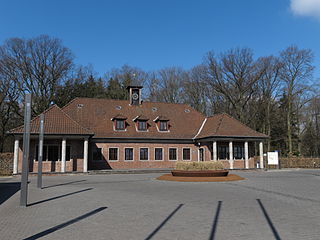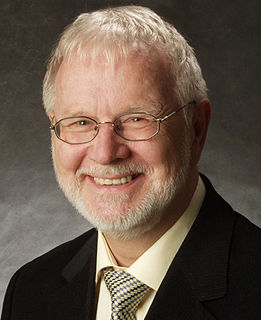
The University of Göttingen, officially the Georg August University of Göttingen, is a public research university in the city of Göttingen, Germany. Founded in 1734 by George II, King of Great Britain and Elector of Hanover, and starting classes in 1737, the Georgia Augusta was conceived to promote the ideals of the Enlightenment. It is the oldest university in the state of Lower Saxony and the largest in student enrollment, which stands at around 31,600.
The Soil Association is a British registered charity. Its activities include campaigning – against intensive farming, for local purchasing and public education on nutrition – and certification of organic foods. It was established in 1946.

Biodynamic agriculture is a form of alternative agriculture very similar to organic farming, but it includes various esoteric concepts drawn from the ideas of Rudolf Steiner (1861–1925). Initially developed in 1924, it was the first of the organic agriculture movements. It treats soil fertility, plant growth, and livestock care as ecologically interrelated tasks, emphasizing spiritual and mystical perspectives.
Ulf Hohmann is a German ethologist, whose studies about the raccoon have played a significant role in the understanding of its social behavior and its distribution in Germany.
The Research Institute of Organic Agriculture, is one of the world's leading organic farming information and research centres. As an independent and non-profit organization, it promotes research and projects that help farmers improve their productivity with consideration of environmental and health impacts.

The Federal Agricultural Research Center (FAL), headquartered in Braunschweig, was a federal authority of the Federal Ministry of Food, Agriculture and Consumer Protection. On January 1, 2008, FAL was split into the Johann Heinrich von Thünen Institute, the Julius Kuehn Institute and the Friedrich Loeffler Institute.
Roberto Simanowski is a German scholar of literature and media studies and founder of dichtung-digital.

The Hannover–Braunschweig–Göttingen–Wolfsburg Metropolitan Region is an economic and cultural region in Northern Germany. The metropolitan area comprises approximately one third of the area of Lower Saxony, with almost half the inhabitants of the state. It has about 3.9 million people in 20 districts and counties with a total of 431 municipalities and is defined by the German Ministerkonferenz für Raumordnung (MKRO) as a medium urban area in Germany.

Andreas Spengler is a German psychiatrist and researcher who conducted through 1974 and 1975 a well-known sociological study on sadomasochism in men at the Institute for Sexual Research in the University Hospital Eppendorf in Hamburg, Germany.

Friedrich Stadler is an Austrian historian and philosopher and professor for history and philosophy of science at the University of Vienna. He is the founder and long-time director of the Institute Vienna Circle, which was established as a Department of the Faculty of Philosophy and Education of the Vienna University in May 2011. Currently he is a permanent fellow of this Department and serves at the same time as the Director of the co-operating Vienna Circle Society, which is the continuation of the former Institute Vienna Circle as an extra-university institution.
Torsten Müller is an agricultural scientist at the University of Hohenheim. He is chairman of the examination and admissions board of the European master's degree Course "Organic Agriculture and Food Systems" and Dean of Education of the Agricultural Science Faculty in Hohenheim.

Friedhelm Gehrmann is a German scientist in the field of economics and social sciences. Since 1981, he has been teaching and consulting in the fields of “International Knowledge and Technology Transfer.” At present, he is the director of the institutes “Global Consulting and Government” and “Renewable Energy, Technology and Management” at Steinbeis-Hochschule Berlin.
Werner Doppler (born December 15, 1941 in Oberlustadt, Germany is an Agricultural Economist. His areas of teaching and research have been Farming Systems, Rural Development and Socioeconomics in the Tropics and Subtropics. He was Dean of Faculty at the University of Hohenheim.

Hartmut Vogtmann is honored as a pioneer in organic agriculture in Germany as well as other countries. He contributes his knowledge and direct engagement to promote organic agriculture in many countries. Specially, he acted as an advisor to Prince Charles since the 1980s in organic agriculture. From 2012 to February 2015 he was president of the umbrella NGO "German League for Nature and Environment" (DNR) with an individual membership of more than 5 million. He served this organisation from 2008 until 2012 as its first vice-president. From 2008 until 2011 he was the president of the foundation for the conservation of the European Natural Heritage "Euronatur".
Erich Kirchler is an Italian-Austrian psychologist and Professor of Economic Psychology at the University of Vienna.
Uwe Wolf is a German musicologist. He worked for the Johann Sebastian Bach Institute in Göttingen and Bach-Archiv Leipzig, where he developed the Bach Digital website. Since 2011, he has been chief editor of Carus-Verlag, editing the 2013 edition of Monteverdi's Vespro della Beata Vergine, among others.
Joachim Hans Albrecht was a German musicologist and university lecturer. He was professor at the Christian-Albrechts-Universität zu Kiel.

Lukas Bärfuss is a Swiss writer and playwright who writes in German. He won the Georg Büchner Prize in 2019.
Arnfried Edler is a German musicologist and university faculty in Kiel and Hanover.

Uwe Pape is a German business information scientist and organ expert.










